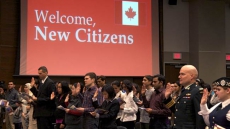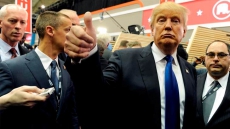EDMONTON — New Democrat MPs will return to the House of Commons today after an emotional and divisive weekend that ended up costing Tom Mulcair his job as leader.
Not only does the federal party now have to contend with a potentially divisive leadership race within the next 24 months, it also has to contend with a now very-apparent rift with the governing Alberta NDP.
The two sides did battle over the policy proposals of the "Leap Manifesto," a left-wing pivot that calls for a number of dramatic measures to ease climate change, including an end to pipeline development and fossil-fuel dependency — ideas not popular in oil-rich but job-starved Alberta.
A leadership battle isn't likely to make matters easier.
Nor will the fact Mulcair plans to remain as leader of the party until a successor is chosen, a decision that could be two years away.
After he failed to garner even a simple majority in Sunday's leadership vote, Mulcair says he plans to continue to work on issues in Parliament for as long as necessary.
There will be other challenges as well, like the financial burdens of an upcoming leadership race as ambitious candidates divide the party's fundraising sources for their own individual campaigns. Some New Democrats also privately worry the party won't be able to raise money with Mulcair as leader.
At the convention, the party signalled it has yet to receive all of its filings from Elections Canada, but it is projecting a debtload of as much as $5 million, a legacy of last year's 78-day election campaign.
The NDP's executive council, its key decision-making team, met on Sunday to initiate a process to determine next steps that will eventually set the wheels in motion for a leadership race.

"The membership's desire for change and renewal has been heard," the party's national director Karl Belanger said in a letter to supporters.
"In the months ahead, we will work tirelessly with you to renew, rebuild, and strengthen this great party of ours. This convention has shown that New Democrats are dynamic, energized, and strongly invested in renewal."
On Wednesday, the caucus is expected to meet as per usual, but they will have a lot more than usual to discuss.
Some members of caucus have already quietly questioned whether it's in the best interests of the party and the goal of moving forward to keep Mulcair at the helm until his successor is chosen.
There's also the question of who will replace him and how soon hopefuls will organize their campaigns.
No one openly challenged Mulcair in the weeks before Sunday's vote, but some of his leadership rivals from 2012, including Manitoba MP Niki Ashton, were pointed in their refusal to endorse his leadership.
Former MP Peggy Nash, another leadership contender four years ago, penned a scathing critique of the NDP's election campaign ahead of the convention.

B.C.'s Nathan Cullen, who finished third in the 2012 leadership race, endorsed Mulcair and said he's no longer interested in leading the party.
Then there's the matter of the Leap Manifesto, which highlighted the ongoing tug of war between those who wish to see the party return to its left-wing socialist roots and others who favour Mulcair's centrist approach as the more likely path to forming a government — last year's experience notwithstanding.
Peter Julian, a veteran B.C. MP, said Sunday the party is resilient and has already faced adversity including after October's election result and the death of Jack Layton.
"Remember, this is a caucus and a party that lost our leader Jack Layton," he said.
"I came into politics because of Jack Layton. We have gone through what, in many other parties, would be extraordinarily difficult situations. In our party, we have a resilience so we get back to work."
A TIMELINE OF THE TOM MULCAIR'S ROLLER COASTER RIDE AT THE HELM OF THE NDP
EDMONTON — A year ago, the New Democratic Party was surfing a swelling wave and Tom Mulcair appeared poised to become the first NDP prime minister in Canada's history. Poll numbers and party donations were rising and everything looked to be cresting at the perfect moment in the election cycle.

But the wave broke and crashed well short of the party's 2011 high-water mark. The NDP finished the Oct. 19 election a distant third and lost more than half its seats in the House of Commons.
Mulcair, blamed for running a cautious, uninspiring campaign, paid the price Sunday as a majority of delegates to the NDP convention in Edmonton voted to hold a leadership contest to find his replacement.
Here's a chronology of the ups and downs of Mulcair's leadership:
Oct. 13, 2011: Mulcair announces his candidacy for the NDP leadership, left open after the untimely death of Jack Layton, who had led the party to its best eA ver finish — and official Opposition status — just a few months earlier. His campaign is based on Mulcair's ability to hang on to the party's 2011 gains in Quebec and lead the NDP to victory in the next election.
March 15, 2012: Former NDP leader and party icon Ed Broadbent, who backs leadership rival Brian Topp, launches blistering attack on front-runner Mulcair. Broadbent questions whether Mulcair, a one-time Quebec Liberal cabinet minister, is committed to NDP orthodoxy and suggests he's not a team player.
March 24, 2012: Mulcair wins the leadership on the fourth ballot, beating out Topp.
Spring 2013: Mulcair wins high praise for his prosecutorial grilling of Prime Minister Stephen Harper over the Mike Duffy scandal.

April 14, 2013: Justin Trudeau is elected leader of the Liberal party, reviving its fortunes and displacing the NDP in opinion polls and a series of byelections as the alternative to the Conservative government.
May 5, 2015: Rachel Notley leads the Alberta NDP to a historic election victory, ending a 44-year Progressive Conservative dynasty. The result galvanizes the federal NDP, which quickly vaults back into the lead in opinion polls.
May 9, 2015: Mulcair uses the Alberta result to inspire a Montreal rally: "They said we wouldn’t be able to pierce through in Alberta. (But) the NDP has just formed the government. And now they’re saying we still can’t win at the federal level. Let’s wait to see on Oct. 19."
June 23, 2015: Polling data suggests Mulcair's personal popularity is at more than 60 per cent, compared with 46 per cent for Justin Trudeau and 32 per cent for Stephen Harper.
July 31, 2015: Elections Canada data on political donations shows the NDP collecting $4.5 million from 48,314 donors in the second quarter of the year, its best quarterly showing ever, both in terms of money and the number of donations.
Aug. 4, 2015: Federal election called for Oct. 19. Most polls suggest the NDP holds a slight lead over the Conservatives and Liberals.

Aug. 25, 2015: Mulcair vows an NDP government would balance the budget every year, in contrast to Trudeau who promises to run modest deficits in order to invest in job-creating infrastructure projects. In retrospect, many New Democrats decide this was a turning point that allowed Trudeau to outflank Mulcair on the left.
Sept. 24, 2015: In a televised French-language debate, tempers flare over the niqab, which the Conservatives want banned during citizenship ceremonies. Mulcair staunchly defends the right of women to wear the head covering, a controversial stand in Quebec.
Sept. 27, 2015: Polls begin to suggest a slippage in NDP support, with the Liberals creeping up.
Sept. 28, 2015: Mulcair declares: "We’re planning to win on Oct. 19 and form a strong, stable, majority New Democratic government for the first time in Canadian history."
Oct. 9, 2015: Polls suggest NDP support had slipped to roughly 25 per cent. "We are confident that the NDP is going to win this election and we are confident of that based on my constant travels across the country over the last several months," says Mulcair.
Oct. 19, 2015: Liberals win the election with 39.5 per cent of the vote and 184 seats. The Conservatives took 31.9 per cent of the vote and 99 seats, while the NDP got 19.7 per cent and 44 seats.
Nov. 24, 2015: As leader, Mulcair takes responsibility for the disappointing elections results but insists he'll remain leader. “Yes, I will stay on, I’ve got very strong support in the party,” he says in a radio interview. “The party membership has always been there for me and I expect them to be there in April.”
Feb. 9, 2016: Party president Rebecca Blaikie releases an interim post-mortem report on what went wrong with the NDP campaign. Report says the NDP, in part due to Mulcair's balanced budget pledge, represented "cautious change" whereas the Liberals were perceived as "real change" by voters wanting a dramatic break from the Conservative era.

March 2, 2016: Polling suggests NDP support has fallen since the election. One survey had the party at just over 14 per cent, while another had it just under 12 per cent.
April 10, 2016: Fifty-two per cent of delegates at the NDP convention vote to hold a leadership contest to replace Mulcair; just 48 per cent support his continued leadership.





